As the internet becomes more popular and integrated into our daily lives, online businesses have grown exponentially. In 2022, there are reportedly 2.14 billion shoppers online, a 4.4% increase from 2021. Tap into this market and maximize your business’ potential by building a powerful brand presence online.
Choosing the best online platform for your business has never been easier. In this blog, we’ll be discussing the top 10 CMS software in 2022, explaining their benefits, and how best to use them.
Top CMS Software: Choose The Best One For Your Business:
What is a CMS Software?
CMS stands for Content Management System. It is software that is used to create and manage digital content. This can include website content, blog posts, articles, eCommerce products, and more. A CMS software typically has two main components: a back-end CMS platform and a front-end web server.
Back-end CMS Platform
The backend CMS platform is used to create and manage the content. This is where you will find the CMS software tools and features such as a text editor, image library, and template manager. Moreover, it allows you to manage the site’s structure, including menus and pages. You can use this platform to create new content, edit existing content, add comments, and publish online.
Front-end Web Server
The front-end web server is used to host the website and display the web content to visitors. This will include an HTML editor (to create the website’s markup), a CSS editor (to style the website), a JavaScript library (for adding interactivity and effects), as well as hosting files for images, fonts, etc. Once you have created your website using these two components of the CMS software, you will need to configure the server and install the appropriate software.
Top CMS Software
Now that we have an understanding of what a CMS is and how it works, let’s take a look at the best CMS software.
1. BigCommerce
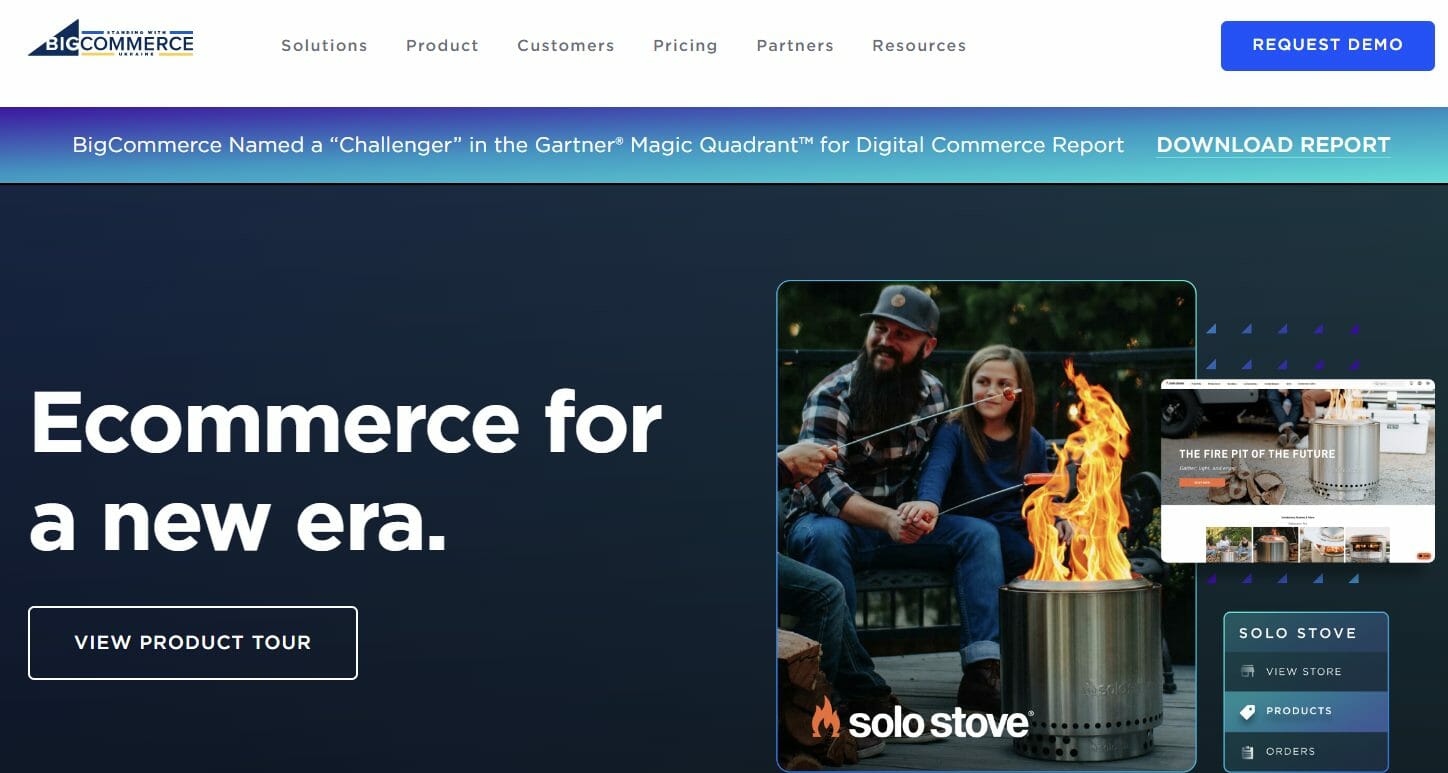
As one of the industry’s most versatile solutions for innovative eCommerce, BigCommerce provides you with a robust and stable platform to power your business. With an open architecture that empowers you to focus on what matters most – optimizing growth!
Connecting WordPress sites is easy when using the prebuilt plugin of BigCommerce, which allows brands who have editorial or content focuses to create unique storefronts within the dashboard of one account. In addition, the company integrates with over 1,500 eCommerce plugins and platforms to provide you with optimal performance. Plus, BigCommerce makes it simple for you to manage orders from anywhere in the world, plus set up automatic order fulfillment if your products are sold through an eCommerce partner like Fulfillment by Amazon.
BigCommerce is a reliable and easy-to-use software that allows businesses of all sizes to run their online storefronts effectively. With a wide range of features that integrate seamlessly with other popular tools, this platform provides capabilities for both beginners and experienced entrepreneurs alike.
2. WordPress
With over 40% of websites being built on WordPress, it is undoubtedly the most popular CMS software today. What makes WordPress so successful? First and foremost, it is very easy to set up and manage. You can create a website with just a few clicks of the mouse. Additionally, its plugins and themes store is vast, allowing you to customize your site exactly how you want it. Another advantage of using WordPress is its millions of templates available for downloading or Building from scratch. There are two WordPress CMS options: WordPress.com and WordPress.org.
WordPress.com

WordPress.com is a hosted platform of the open-source CMS software, WordPress, whose features include customizable themes, mobile-friendly websites, and plug-ins that allow you to manage your site’s content, search engine optimization (SEO), security, and backups. They also offer features such as automatic updates, moderator tools, and built-in social media integration that make it a powerful choice for smaller businesses or organizations who want to launch a website with minimal effort.
WordPress.org

WordPress.org is the original and most popular WordPress CMS platform. It includes more features than the hosted version of WordPress.com, but it can be more challenging to set up and manage if you are not familiar with code editing or website design. Since this is self-hosted software, you are responsible for securing the site’s security and backups. Although WordPress.org is more complex to use, it does offer greater customization options and a larger plugin community than the hosted version of WordPress.com.
3. Wix.com

Wix is the best platform for beginners looking to create a sleek website quickly. Its content delivery network (CDN) provides you with a global network of powerful servers strategically located around the world, so your site loads faster for everyone who visits it. With features such as a drag-and-drop design editor and over 500 pre-designed templates, you can create a professional website in just a few hours.
Wix is also a self-hosted platform, which means you will need to set up your own hosting account and install Wix onto it. Moreover, it is not Wix is not just a content management system but an e-commerce platform as well. They offer a wide range of features such as an online store, product catalog, and payment gateway.
4. Joomla
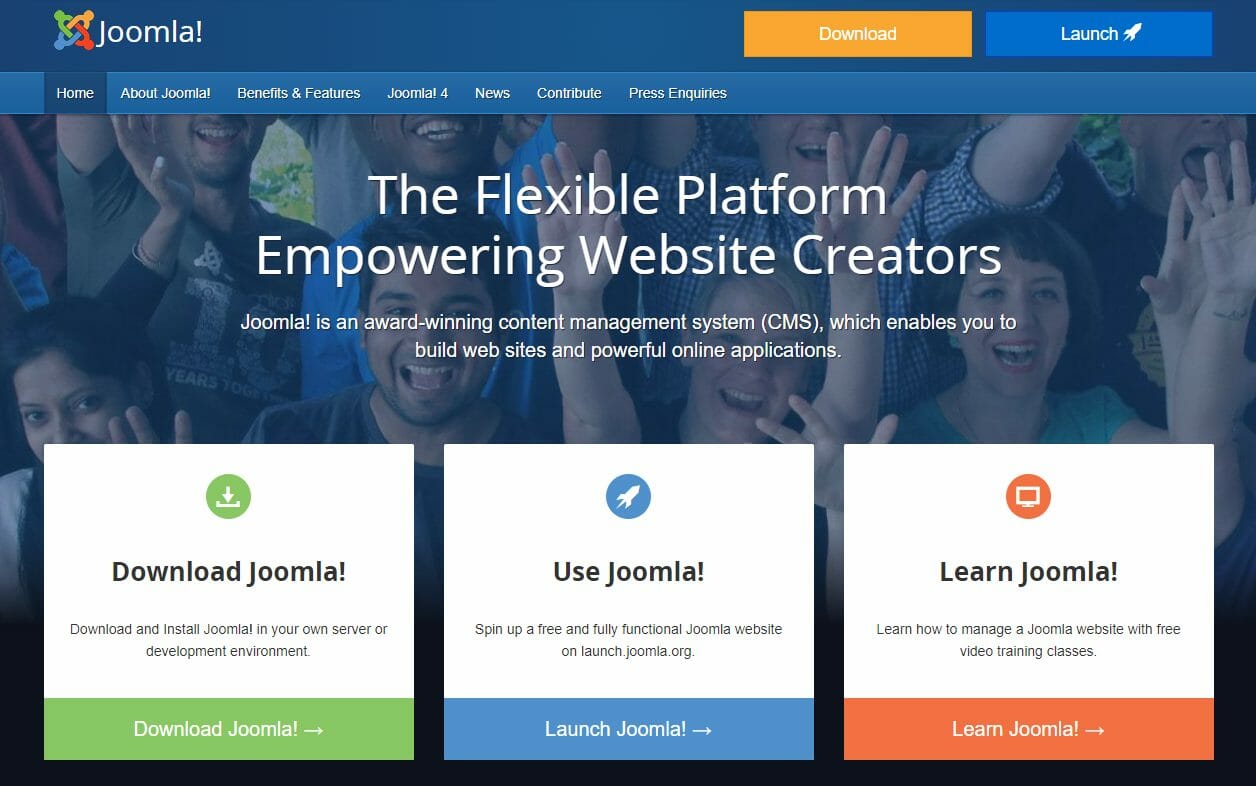
Joomla is an award-winning platform that is being used by millions of people around the world. It is a great choice for those who need a lot of control on high levels of design customizability, as well as a wide range of extensions that you can use to add more features to your websites. Not only does this CMS offers plenty of customization options, but it enables you to build anything from simple blogs and multilingual websites to eCommerce stores.
Joomla is open-source software, which means you will find communities who are willing to provide support for it. Moreover, marketers can use it to create insightful reports that show how website traffic is moving, what keywords are being used on the site, and more. It is not as user-friendly as WordPress or Wix, so you will need some technical skills to use it effectively.
5. Drupal
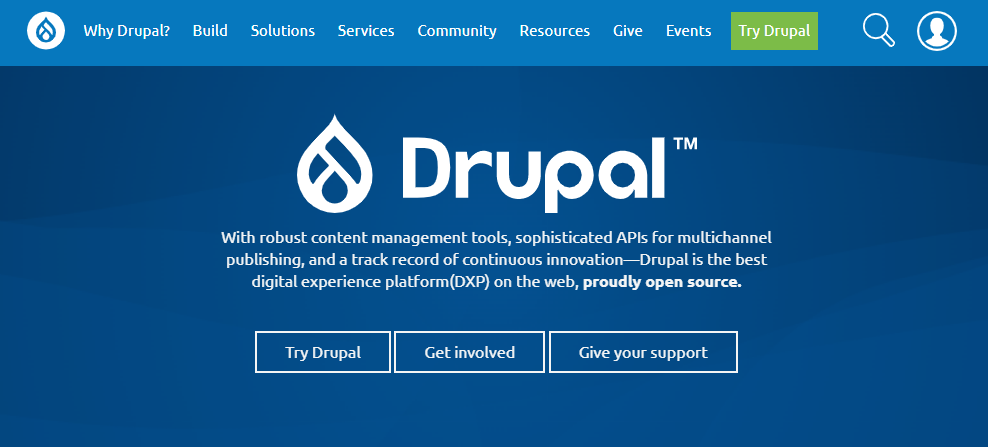
Drupal is a great option for those who want to build highly customized sites that need plenty of data. It is also open-source, which means you have access and freedom when it comes to building your website. It has modules like plugins and themes so you can customize your site’s experience & improve it with ease, all while staying secure thanks to its strict community code review process.
Drupal is a powerful and secure CMS and a great choice for enterprise users who want to scale their websites. However, it does require experience in tech coding and website development to use it effectively. So, if you want to scale your website without sacrificing functionality, Drupal is a great option.
6. Shopify

Shopify is considered a household name when it comes to eCommerce platforms, which is perfect for small businesses who want an affordable platform with plenty of flexibility & customization potential. It is a hosted platform, which means you don’t need to worry about hosting or installing anything. With Shopify, you can easily create custom themes or install extensions that enlarge your site’s capabilities. It is a top choice for online retailers because they take care of all of that for you. Plus, when it comes to personalization and marketing tools, you are provided a ton of add-on apps as options.
Shopify offers a wide range of features, such as a built-in shopping cart, inventory management, product catalog, and payment gateway. You can build a professional and SEO-friendly online store in just a few hours. Moreover, Shopify is user-friendly and easy to use, but it is not as customizable or sophisticated as some of the other CMS software on this list. That said, if you are just starting and don’t need a lot of features, Shopify may be a great option for you.
7. Adobe Commerce (powered by Magento)
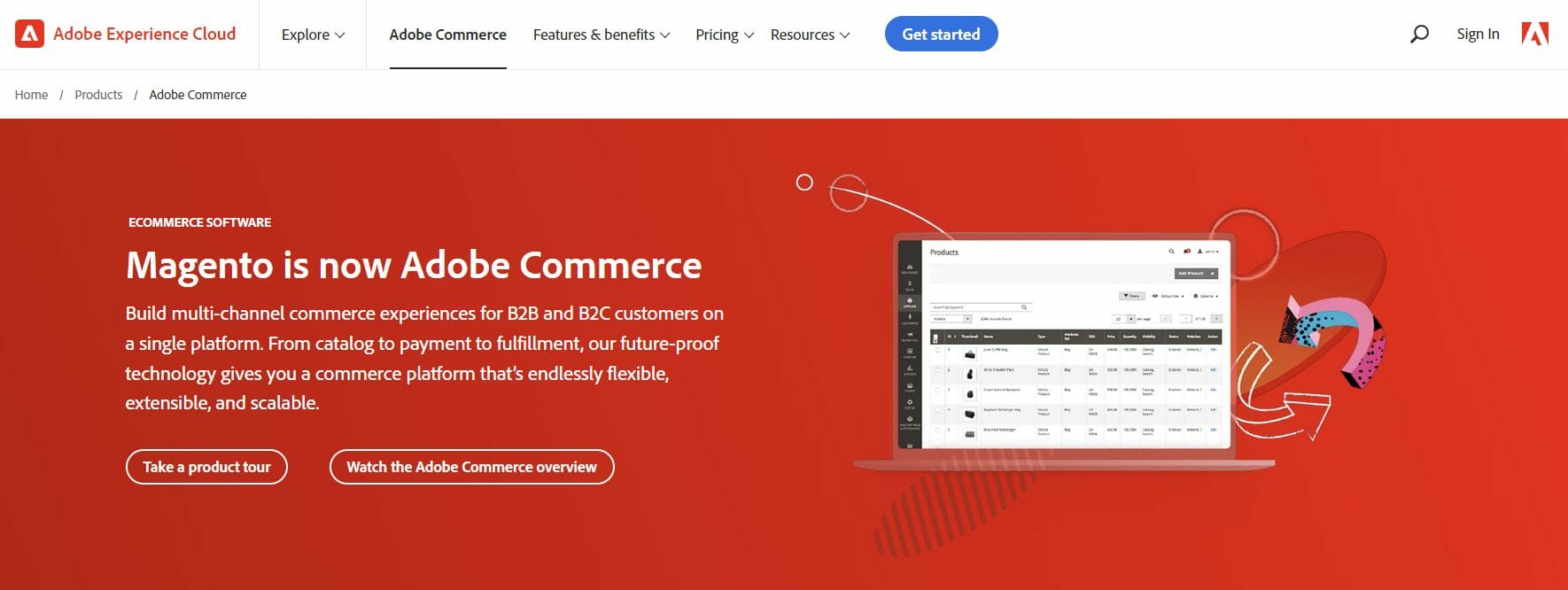
Adobe Commerce, powered by Magento, was created specifically for eCommerce businesses. It is the simple, flexible way to build your next multi-channel commerce experience. Businesses can use Adobe Commerce to create, manage, and deploy eCommerce websites, apps, and APIs. Plus, it offers a wide range of features, such as secure payment processing with Authorize.net, powerful product management capabilities with the Product Catalog, and powerful merchandising tools like multilingual support and cross-sell analysis.
Adobe commerce lets you build a responsive website to power your eCommerce experience the way it works best for your business. With robust APIs, fast performance, and powerful integrations with other Magento extensions, Adobe Commerce is a top choice for eCommerce businesses of all sizes.
8. Pantheon
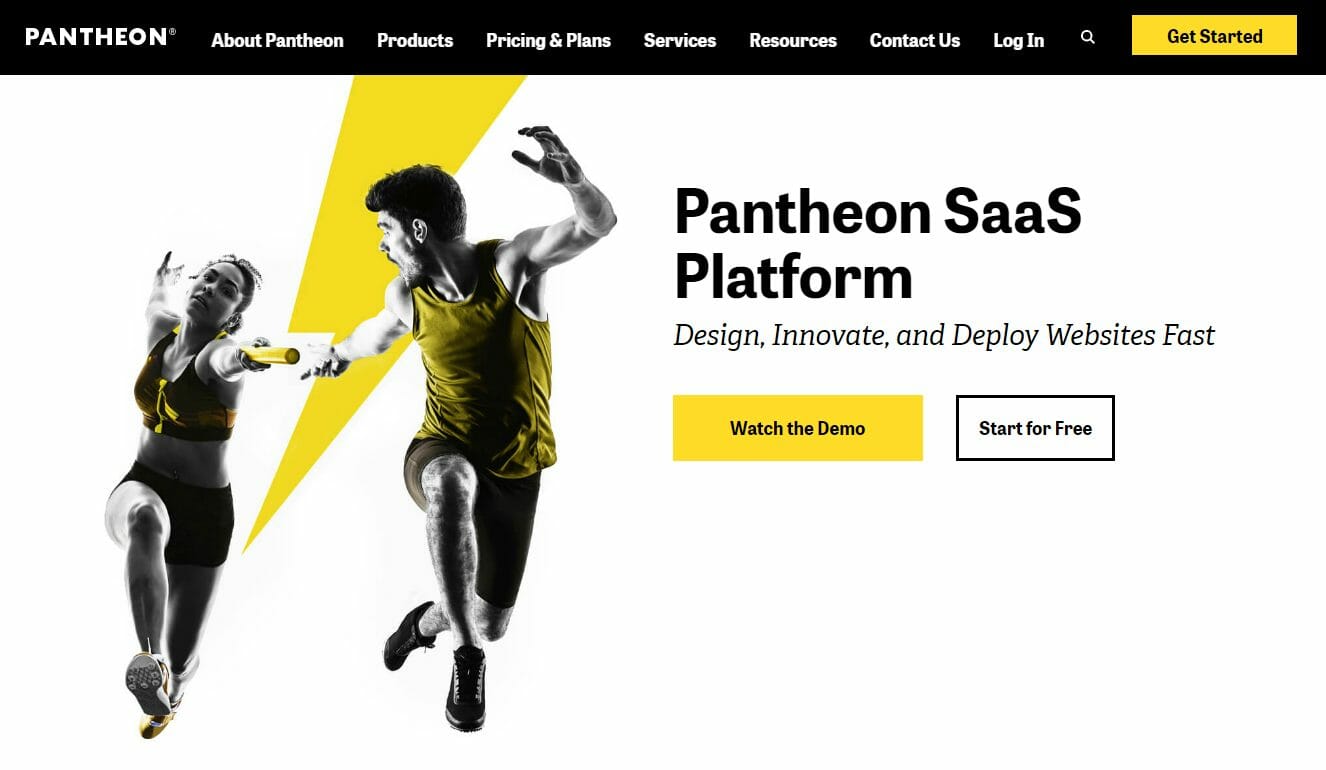
Pantheon’s web operations platform is a game changer for improving website productivity and reducing the cost of making changes. The company offers one-click core updates, no server management, and enterprise-grade scalability, making it the best place to host your website. Their speed is unmatched, thanks in part to their automated high-performance platform, which includes page load times that are lightning fast—even on mobile devices! With security features like SSL and industry-leading data loss prevention (DLP) capabilities, Pantheon is the perfect choice for businesses that need to keep their online presence safe and secure.
9. Weebly
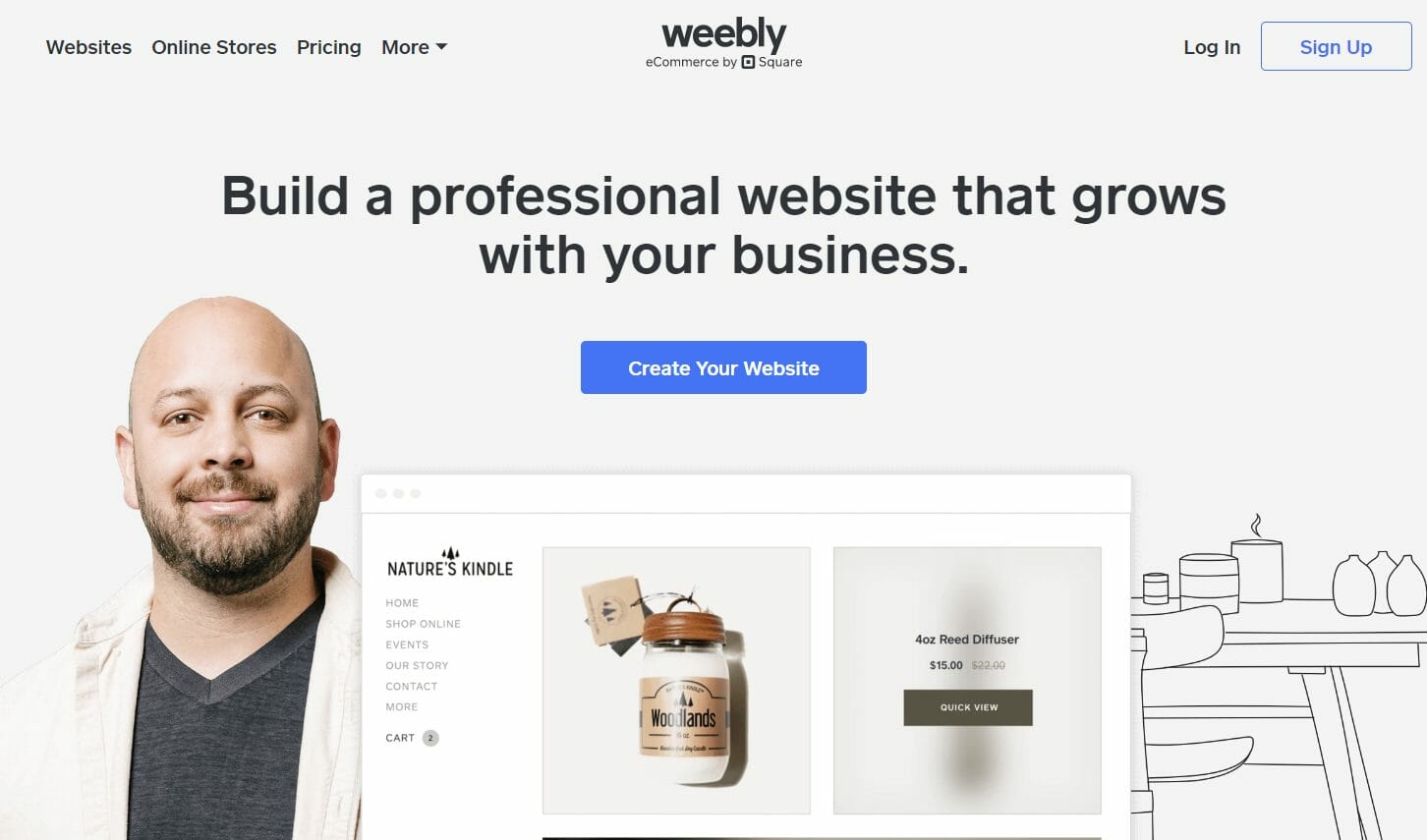
Weebly is one of Square’s products in their suite of that commerce solutions. With easy drag-and-drop website creation and the ability to build a variety of websites, Weebly is perfect for anyone who wants an easy time setting up their own business website. In addition to this, Weebly has customizable templates that you can use to create your very own website, which makes it simple for you to get started.
Weebly is known for its easy-to-use drag-and-drop builder that makes web design simple and fun. This makes it perfect for first-time entrepreneurs who want to take their business online without prior experience! With over 1 million websites created using Weebly, there’s a great chance your business can benefit from this popular platform.
10. Webflow
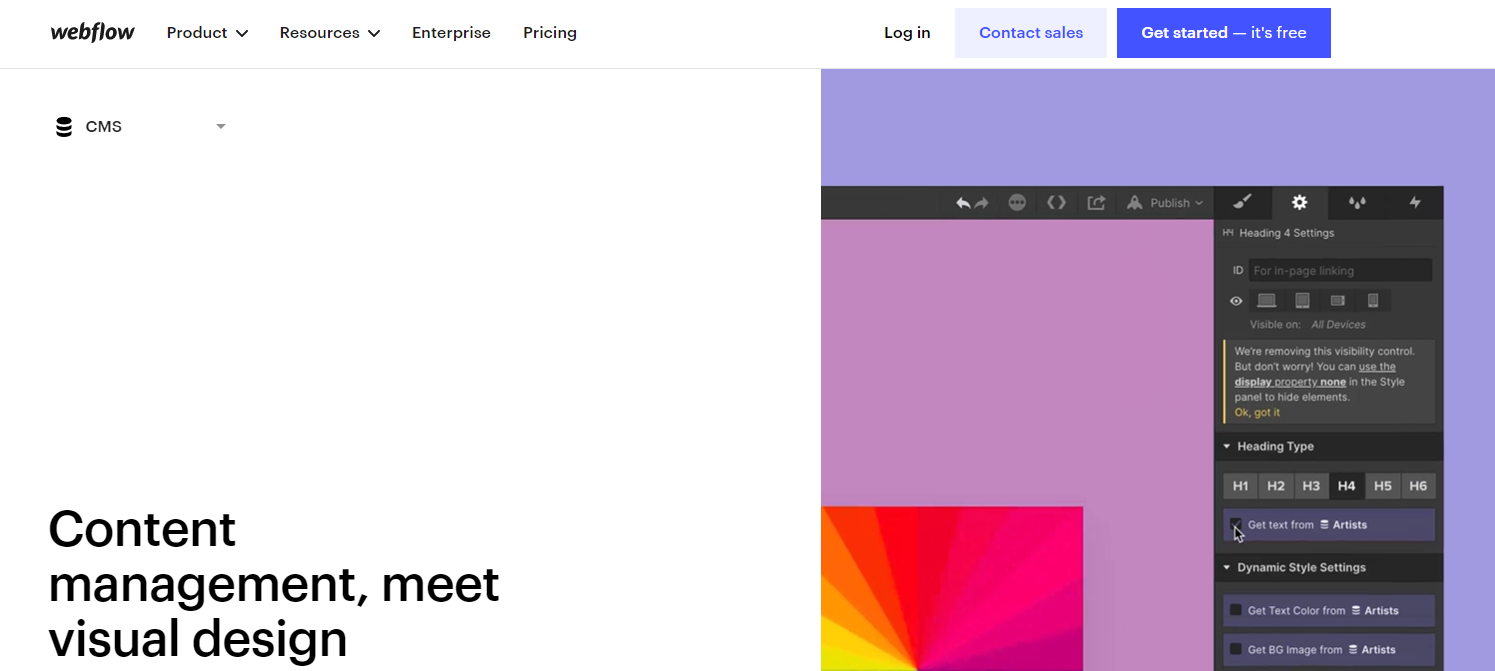
Webflow is the perfect content management system for designers and developers. It allows you to create visually appealing layouts with your own designs, add any type of text or images that are desired (even videos), then publish all this information on a website in just one step. The platform also gives editors easy access so they can make changes quickly without having too much trouble navigating through different screens.
Webflow isn’t just a website builder—it’s an all-inclusive CMS that allows you to create and edit your pages without any coding knowledge. You can add text, videos, or images from various sources like Google Drive – even download files directly onto the platform if needed (think: CSV).
The best part? When it is time for design work, these structures are already set up, so there won’t be anything lost by moving forward with the interface of Webflow.
Why should you use CMS Software?
A content management system is a great investment for your business. Your website serves as your online storefront and information center. Right now, it could probably use some improvement. The most cost-effective way to go about upgrading your site is using CMS software. Here are some more of its benefits:
- Cost Effective
Great websites no longer have to cost your business a huge sum. CMS software makes website management easy on the pocket by eliminating the need to call a web developer for small changes you want to make.
- User-friendly
CMS software is easy to use. Your customers are greeted by a well-designed website, while your employees can access and navigate all the important points of your website with ease. They are also convenient for business owners on the go, as CMS software usually has mobile counterparts. You can access the back-end of your website anytime.
- SEO-optimized
CMS Software has SEO features and plugins integrated into the site, proving to be a useful tool in your marketing strategy. You can configure your URL Settings, blogging tools, XML Sitemaps, and more to help your website rank high on search engines and drive customers to your site. Search generates 35% of all eCommerce traffic, so you should not miss out on this CMS feature.
How to choose the best CMS for your business?
Using a CMS has many benefits, but it is important to choose the right one for your business. Before choosing a platform, consider what you need from it. Do you want a simple way to create and manage your website content, or do you require advanced features like marketing automation? Once you have an idea of what needs are necessary, consider the following:
Content Hub User Interface
Most CMSs are easy to learn and use, regardless of your experience level. This means you can get up and running quickly without spending hours configuring the platform yourself. When considering CMS software, consider the ease of use for your team. The content hub of your chosen CMS should be user-friendly, with a clear and concise layout that is easy to navigate. Additionally, it should offer quick and easy access to all the content your team needs without having to wade through layers of menus.
Customization Options
Choosing CMS software requires some initial investment, but this is often offset by the ability to customize the platform to your own business needs. They typically offer a wide range of customization options, from basic settings like colors and fonts to more complex features like marketing automation or advanced content management systems. Consider what specific customization options are important for your business, and make sure that the chosen platform offers them all.
Security and Support Services
When it comes time to use your new CMS, you’re likely going to need support at some point in time. This might mean technical assistance if you don’t understand how certain functions can tailor every aspect of the platform to fit your needs perfectly. Furthermore, if your business grows and you need to add staff, you’ll likely need to invest in a team of support specialists who can help keep the platform running smoothly. Make sure that the CMS software you choose offers robust security and support services so your business can grow without worrying about disruptions or data breaches.
Marketing Automation Features and Integrations
As marketing plays an increasingly important role in all businesses, it makes sense to seek a platform that offers powerful marketing automation features and integrations. This could involve tools like email marketing campaigns, social media management, lead conversion tracking, or even newsletters. Make sure that the CMS software you choose offers these comprehensive capabilities so your business can continue to grow while staying ahead of the curve.
Subscription Pricing
When evaluating subscription pricing for a content management system, make sure to consider the long-term costs to be incurred. The most expensive pricing plans can quickly become out of reach if you do not keep up with annual renewal requirements or extra fees associated with specific features, such as marketing automation or e-commerce integration. Besides, other costs like a custom domain name and email address are likely to add up when using a CMS for your business. So, when you consider the pricing, take into account not only the initial cost but future costs as well.
Reporting and Analytics
Data is important for any business, and a content management system should make it easy to access and analyze data from your website. Many platforms offer powerful reporting capabilities that allow you to see how your website is performing overall, as well as key information on individual pages or posts. This can help you make informed decisions about where to allocate resources and determine which marketing campaigns are most effective.
Final Thoughts
When it comes to CMS software, there is a multitude of options available to businesses of all sizes. It is important to carefully consider your needs and choose the platform that will provide the best overall solution for your business. Make sure to research each option thoroughly, compare pricing, and review user reviews to select the perfect CMS software for your organization. At the end of the day, you want to make sure that your CMS software is affordable and easy to use, so you can focus on running your business rather than worrying about the technical side of things.
About the Author
![]()
Writer
Geri Mileva, an experienced IP network engineer and distinguished writer at Influencer Marketing Hub, specializes in the realms of the Creator Economy, AI, blockchain, and the Metaverse. Her articles, featured in The Huffington Post, Ravishly, and various other respected newspapers and magazines, offer in-depth analysis and insights into these cutting-edge technology domains. Geri’s technological background enriches her writing, providing a unique perspective that bridges complex technical concepts with accessible, engaging content for diverse audiences.





